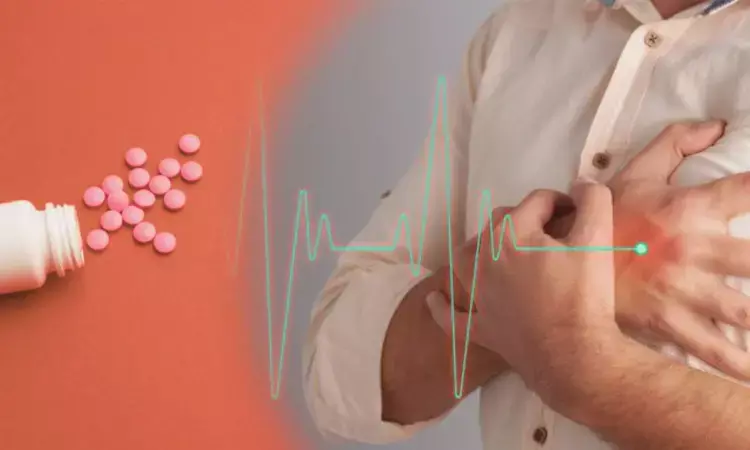- Home
- Medical news & Guidelines
- Anesthesiology
- Cardiology and CTVS
- Critical Care
- Dentistry
- Dermatology
- Diabetes and Endocrinology
- ENT
- Gastroenterology
- Medicine
- Nephrology
- Neurology
- Obstretics-Gynaecology
- Oncology
- Ophthalmology
- Orthopaedics
- Pediatrics-Neonatology
- Psychiatry
- Pulmonology
- Radiology
- Surgery
- Urology
- Laboratory Medicine
- Diet
- Nursing
- Paramedical
- Physiotherapy
- Health news
- Fact Check
- Bone Health Fact Check
- Brain Health Fact Check
- Cancer Related Fact Check
- Child Care Fact Check
- Dental and oral health fact check
- Diabetes and metabolic health fact check
- Diet and Nutrition Fact Check
- Eye and ENT Care Fact Check
- Fitness fact check
- Gut health fact check
- Heart health fact check
- Kidney health fact check
- Medical education fact check
- Men's health fact check
- Respiratory fact check
- Skin and hair care fact check
- Vaccine and Immunization fact check
- Women's health fact check
- AYUSH
- State News
- Andaman and Nicobar Islands
- Andhra Pradesh
- Arunachal Pradesh
- Assam
- Bihar
- Chandigarh
- Chattisgarh
- Dadra and Nagar Haveli
- Daman and Diu
- Delhi
- Goa
- Gujarat
- Haryana
- Himachal Pradesh
- Jammu & Kashmir
- Jharkhand
- Karnataka
- Kerala
- Ladakh
- Lakshadweep
- Madhya Pradesh
- Maharashtra
- Manipur
- Meghalaya
- Mizoram
- Nagaland
- Odisha
- Puducherry
- Punjab
- Rajasthan
- Sikkim
- Tamil Nadu
- Telangana
- Tripura
- Uttar Pradesh
- Uttrakhand
- West Bengal
- Medical Education
- Industry
SGLT2 inhibitor ertugliflozin fails to prevent HF hospitalization at EF>60 percent: VERTIS CV analyses

USA: Post-hoc analyses of the VERTIS CV trial failed to show the ability of SGLT2 inhibitor ertugliflozin (Steglatro) to reduce hospitalization for heart failure (HHF) applied to people with baseline ejection fractions (EF) above 60%. The study findings were published in the European Heart Journal October 21, 2023.
Sodium-glucose cotransporter 2 (SGLT2) inhibitors consistently reduce the risk of HHF among those with heart failure (HF) with reduced ejection fraction. However, not much is known about the treatment efficacy at or above the normal EF range (>60%).
VERTIS CV was the cardiovascular (CV) outcome trial for ertugliflozin in type 2 diabetes mellitus (T2DM) patients and atherosclerotic cardiovascular (CV) disease. In the trial, ertugliflozin met the non-inferiority criterion for the primary endpoint of major adverse CV events. However, it did not meet superiority for the secondary endpoints, including HHF or CV death, CV death (alone), and a kidney composite (renal death, dialysis/transplantation, doubling of serum creatine). Pre-specified secondary analyses showed a significant 30% risk reduction in first and total HHF. 24% of participants had a history of HF in the VERTIS CV trial.
In the post hoc analysis, Ambarish Pandey, University of Texas Southwestern Medical Center, Dallas, TX, USA, and colleagues evaluated the effects of ertugliflozin on the risk of first and total HHF across the spectrum of pre-trial EF.
The VERTIS CV trial included 8246 participants aged ≥40 years. They were randomized in a ratio of 1:1:1 to receive once-daily ertugliflozin (5 mg, 15 mg), or placebo with a mean follow-up of 3.5 years.
Data on pre-trial EF were obtained from medical records with the EF closest to the randomization date recorded. Treatment effects of ertugliflozin versus placebo on the risk of first and total heart failure hospitalization were analyzed using adjusted Cox models for first HHF and Andersen–Gill models for total (i.e. first + recurrent) HHF events.
The researchers reported the following findings:
· In the overall cohort, ertugliflozin (vs. placebo) significantly reduced the risk of the first HHF [hazard ratio (HR) 0.70].
· In the subgroup analysis by pre-trial EF, the interaction between treatment and EF did not reach significance for the first HHF. However, the strength of association between ertugliflozin and the risk of first HHF is numerically greater among participants with EF ≤ 45% (HR 0.48) than in other groups.
· The treatment effect of ertugliflozin for the first HHF among participants with EF > 60% (HR 0.72) was comparable with that observed in the overall cohort.
· Ertugliflozin reduced the risk of total HHF events [rate ratio (RR) 0.70] in the overall cohort.
· The treatment effect of ertugliflozin on total HHF appeared to be modified by pre-trial EF, with the greatest benefit noted among those with ≤45% (RR 0.39).
· The treatment effect of ertugliflozin on total HHF was attenuated among participants with EF > 60% (RR 0.68).
· Similar findings were observed in restricted quadratic splines across a continuous EF such that ertugliflozin reduced the risk of first HHF consistently across the EF distribution but had a greater treatment effect for reducing total HHF among individuals with lower (vs. higher) pre-trial EF.
"Taken together, our study findings suggest that the ertugliflozin's treatment effect on HHF demonstrated in the overall analyses is exaggerated at lower pre-trial EF thresholds (<45%) and attenuated at higher EF thresholds," the researchers concluded.
Reference:
Pandey, A., Kolkailah, A. A., Cosentino, F., Cannon, C. P., Frederich, R. C., Cherney, D. Z., Pratley, R. E., Cater, N. B., Gantz, I., Mancuso, J. P., & McGuire, D. K. Ertugliflozin and hospitalization for heart failure across the spectrum of pre-trial ejection fraction: Post-hoc analyses of the VERTIS CV trial. European Heart Journal. https://doi.org/10.1093/eurheartj/ehad639
Dr Kamal Kant Kohli-MBBS, DTCD- a chest specialist with more than 30 years of practice and a flair for writing clinical articles, Dr Kamal Kant Kohli joined Medical Dialogues as a Chief Editor of Medical News. Besides writing articles, as an editor, he proofreads and verifies all the medical content published on Medical Dialogues including those coming from journals, studies,medical conferences,guidelines etc. Email: drkohli@medicaldialogues.in. Contact no. 011-43720751


